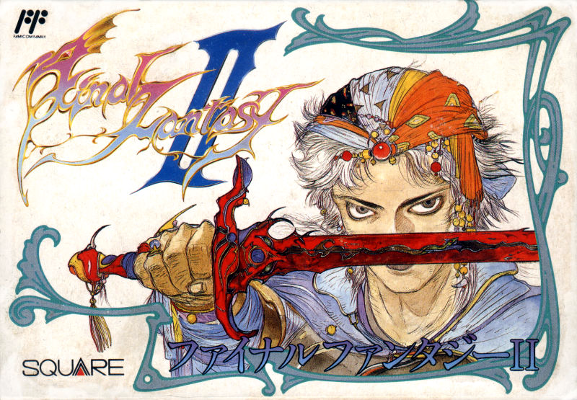Personal Memories of Final Fantasy II (Famicom)

After live streaming a playthrough Final Fantasy for the Nintendo Entertainment system, I recently moved on to stream a playthrough of Final Fantasy II for the Famicom. It's another game that I had played long ago in the past, but only ever as one of it's many remakes, and never its original iteration. This is because Final Fantasy II was never released on the NES outside of Japan, and thus would not be localized until its many remakes on the PlayStation, Game Boy Advance, and the much later Pixel Remaster version. And you shouldn't confuse Final Fantasy II with Final Fantasy IV, the latter of which had been renamed in North America from IV to II after the real Final Fantasy II and III had originally been completely skipped over for localization and left this really weird gap in release order.
Final Fantasy II to this day continues to be something of the forgotten child amongst all of Square's children, and it's easy to see why. Lots of players are not at all big fans of the game's character progression system. Under the design of Akitoshi Kawazu, your characters in Final Fantasy II increase their usefulness only under specific actions. Proficiency in any given weapon type (sword, bow, etc.) is tied to how often you used those weapons in battle. Using those weapons makes your characters stronger. Using magic increases your MP. Using a specific type of spell repeatedly (Fire, Ice, Cure, etc.) will raise your proficiency in that spell. Even your HP and defense is tied to your character taking hits and receiving damage. And while on paper this doesn't sound like a bad idea, in execution it simply became a chore. Leveling up your magic abilities required using that spell hundreds upon hundreds of times to get it to be even remotely effective during battle. And if your characters were too strong, you weren't likely to take damage from your enemies, leaving you too strong for early areas but entirely too weak to continue forward, causing many players to believe their only recourse of action was to spend hours at a time in battle hitting themselves in the face to increase those stats. In theory, taking actions to increase your proficiency in that action isn't a bad idea, but bare minimum, the required number of times you need to perform an action to increase that proficiency was way too high. It's for that reason that, between my sessions live during my streams, I would also take the time alone boosting these stats, doing the boring grunt work of taking hits and casting magic, while nobody was watching because it simply isn't fun to watch somebody perform the same busy work over and over again, even if I sometimes think it's kind of a soothing thing to do while a TV show or podcast plays in the background.
Playing the Famicom version of Final Fantasy II meant playing a fan translation of the game. For many years, this was the only way to play this game if you lived outside of Japan and didn't speak Japanese. An older, inaccurate version was the only reliable option for many years, but more recently a different fan scrub of this script was released, and it's very functional and comprehensible now. It's truly a shame that this version of the game never made it anywhere outside of Japan. Regardless, I would imagine that most players' preference would not be to play this version of the game. While I've not spent much time with the Pixel Remaster games myself, each of those re-releases of Final Fantasy I through VI comes rolled in with all kinds of quality of life features that make them more accessible to a more modern gamer, so you're almost certain to have a better time with the Pixel Remaster version of Final Fantasy II. But the reason why I have been tackling these original versions of these games is because I think there is value in sharing with people the progress Square was making on the franchise over the last nearly 40 years. It's not always pretty, and it's not always easy, but it's impressive to see a powerhouse title grow from such humble roots into something so big and beloved by countless people around the world. That's an impressive thing to behold, and I think a lot more people should give it a try.
Final Fantasy II takes one more bold step up from its predecessor, in that there is just a hint more of an actual story to be found within the few short hours of its gameplay. Your main characters are orphaned by war, and you join a resistance team to fight against an evil empire, and even that empire's evil Emperor himself. It's not a particularly deep plot, nor is there especially astounding character development. But it's certainly the first signs of Square's Final Fantasy team stretching their legs and attempting to get a little more bold. And how can you argue with killing the Emperor once, seeing him resurrect, and then having to literally travel to Hell in order to kill him a second time? A lot of it has long been compared to Star Wars, which is fair because these developers have always worn their love of Star Wars on their sleeves, but it doesn't make the ambition any less impressive.
My personal recent play of the game largely did not feel like it was going very well. Even after hours upon hours of spending personal time off-stream grinding magic abilities, it felt like it was going absolutely nowhere. Even ranking up some of these magic spells multiple times felt like an exercise in insanity. What do you mean, I have cast this Fire spell hundreds and hundreds of times, and it still only deals four damage? Not four hundred--four. At a certain point I just relegated my run to be nearly magicless. The only spells I used regularly and thus saw any improvement were cures, which admittedly were quite useful. But another problem I ran into was a lack of inventory space. Unlike later Final Fantasy entries, multiples of a particular item (potions, ethers, elixirs, etc.) do not stack into one singular item slot. One potion takes up one item slot. If you buy a second potion, it takes up a second item slot. And your inventory can and will fill up very, very quickly. While in later franchise entries I find myself to be the kind of person who is not afraid to stack up to 99 of any given item in my inventory, I had to be way more careful and picky about what I chose to carry. And in this case, I found that about half of my inventory was now reserved for ethers, in order to keep my characters' MP topped off during long dungeons where the only thing keeping them alive was Cure spells. It took me a lot farther than having only a limited number of heals with a small amount of Potions.
The game is also regularly rotating in multiple guest characters, who all start out with incredibly low stats and die often. You'll want to raise their stats just so that they won't be dead weight while they're in your party, but they also leave the party after a comparatively short amount of time (usually because the plot has decided they need to die permanently), so it almost feels like a waste of time to spend any effort pulling their stats up off the ground. You're sort of damned if you do and damned if you don't in that regard. It's neat that the narrative decides it wants to play with the gravity of various characters' lives in that way, but from a gameplay perspective it does become a little frustrating. Dungeons for this and many other reasons feel tense, and you're never sure if everybody's going to make it all the way to the bottom and back alive. It's kinda neat that the game can make you feel that nervous, but I suppose your mileage may vary when it comes to deciding whether or not that execution of that feeling is actually very good at all.
Thankfully, by the end of the game, it's possible to end up with up to two Blood Swords. Based solely on its stat numbers, it looks like an absolutely awful weapon, but the truth is, if the characters you have wielding these swords are good, they'll take a large percentage of your enemy's health, and even cure your own Blood Sword wielder in the process. By the final trek through Hell, I was struggling without having any magical ability, and the Blood Swords were just about the only thing keeping some of my characters alive. I found myself switching these swords between characters as they got injured, which also helped me use fewer cure spells, and thus fewer Ethers.
And then, shockingly, upon the very final battle with the Emperor of Hell Himself, these Blood Swords made the quickest work of any final boss of any game I think I've ever had. The swords sucked up massive chunks of the Emperor's health, and before I knew it, about four hits in, that was it. The Emperor was dead, and the game was over. Just like that. I had just gone through two nonstop dungeons with no save points to be found anywhere within them, stressing that I wouldn't even be able to make it into the final room of the dungeon, and the Emperor ended up appearing to be the easiest boss fight of the entire game. The balance felt really strange, and yet also a huge relief. I wasn't sure if I was disappointed or proud. Maybe a little bit of both.
Final Fantasy II is a mixed bag, but I don't think it's nearly as bad as a lot of people make it out to be. I think it's a worthy addition to the franchise, and it's an important step in the growth of Final Fantasy. The soundtrack, still composed by famed musician Nobuo Uematsu, continues to be a great listen to this day. The world map music is melancholic, the battle themes are exciting, and the melodies are memorable. Final Fantasy II also marks the introduction of the franchise-favorite mascot creature, the chocobo, along with the chocobo's signature theme music that fans have come to know and love in the decades since. The game is a truly great challenge of an undertaking, especially on the Famicom, but even through bouts of frustrating character progression, it's an important part of gaming history that I think is a mistake to miss out on.
I have been slowly working my way through all of the Final Fantasy games during my livestreams, because it's a fun thing to share with other people, even if these are games I have already played before to an extent. Currently, I have been working on finishing the first of Final Fantasy's spin-off titles, The Final Fantasy Legend. To be fair, it's only labeled as a Final Fantasy game outside of Japan, but in truth it's actually the first of the SaGa franchise, but it looks very familiar in many respects to Final Fantasy II, thanks in large part to being directed by II's designer Akatoshi Kawazu. I anticipate being finished with this game in the next week, and I'm looking forward to doing another write-up about that game once I'm done. I hope I'll see you back here again when I do.

Thank you to all of my Patreon subscribers for making writing about my thoughts and experiences possible. Blogs like this are able to happen more often with your kind support. If you are interested in becoming a member and seeing the perks available, please consider subscribing to my Patreon.
Special thanks to the following Phobos and Mars tier members: Scott Sandler, BetaRayILL, Mannekwin, and MB.
Extra special thanks to Kasei Gumi members Joe Goes Over, Gomer, and a calm sea.

